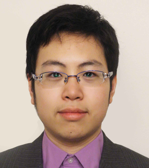 Abstract: Biofilms are surface-attached communities of bacteria that can cause problems including medical infections, fouling, and clogging in industrial applications. By contrast, beneficial biofilms are crucial in applications including waste-water treatment and microbial fuel cells. In this talk, I will discuss about our recent progress in using Vibrio cholerae as a model biofilm former to reveal the mechanical principles underlying biofilm formation, both at the single cell level and at the continuum level. I will first present a new methodology to image living, growing bacterial biofilms at single-cell resolution, and demonstrate how cell-cell adhesion and cell-surface adhesion balance each other to cause V. cholerae to form an ordered, three-dimensional cluster. Next, I will show how extracellular polysaccharides, proteins, and cells function together to define biofilm mechanical and interfacial properties. Finally, I will present various mechanical instabilities that take place when biofilms grow on soft substrates, and how such instabilities, together with interfacial properties, define the morphogenesis process of bacterial biofilms.
Abstract: Biofilms are surface-attached communities of bacteria that can cause problems including medical infections, fouling, and clogging in industrial applications. By contrast, beneficial biofilms are crucial in applications including waste-water treatment and microbial fuel cells. In this talk, I will discuss about our recent progress in using Vibrio cholerae as a model biofilm former to reveal the mechanical principles underlying biofilm formation, both at the single cell level and at the continuum level. I will first present a new methodology to image living, growing bacterial biofilms at single-cell resolution, and demonstrate how cell-cell adhesion and cell-surface adhesion balance each other to cause V. cholerae to form an ordered, three-dimensional cluster. Next, I will show how extracellular polysaccharides, proteins, and cells function together to define biofilm mechanical and interfacial properties. Finally, I will present various mechanical instabilities that take place when biofilms grow on soft substrates, and how such instabilities, together with interfacial properties, define the morphogenesis process of bacterial biofilms.
Biographical Sketch: Dr. Yan obtained his bachelor’s degree from the College of Chemistry and Molecular Engineering at Peking University in China. As a graduate student, he studied soft matter physics in the Department of Materials Science and Engineering at the University of Illinois, Urbana-Champaign. During his Ph.D., he developed a series of non-equilibrium colloidal materials with dynamic structures controlled by electromagnetic fields. He transitioned to biology for his postdoctoral training, working at Princeton University jointly in the Department of Molecular Biology and the Department of Mechanical and Aerospace Engineering. His current research focus is on bacterial biofilm formation. Dr. Yan received the Career Award at the Scientific Interface from Burroughs Welcome Fund in 2016. He moved to Yale as an Assistant Professor in the Department of Molecular, Cellular and Developmental Biology and Quantitative Biology Institute at Yale University in 2019.